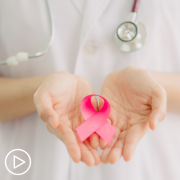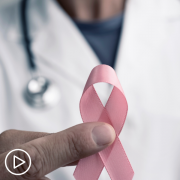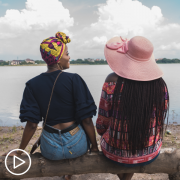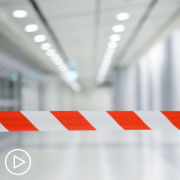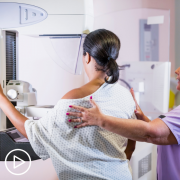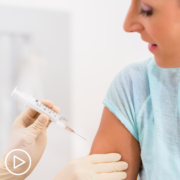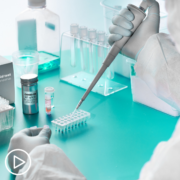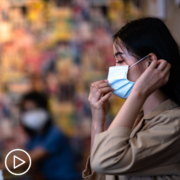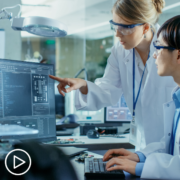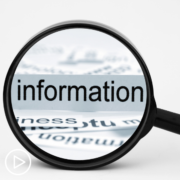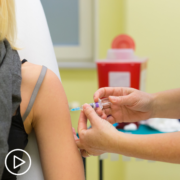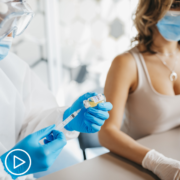How Can I Get the Best Breast Cancer Care No Matter Where I Live? from Patient Empowerment Network on Vimeo.
How can all breast cancer patients get the best treatment no matter where they live? Watch as experts Dr. Nicole Rochester and Dr. Regina Hampton discuss the importance of being comfortable with your own care. Learn about how to find a comprehensive breast center dedicated to patient-centered care and staying in the know regarding your treatment options.
See More From the Best Care No Matter Where You Live Program
Related Programs:
Transcript:
Nicole Rochester:
Hello and welcome. My name is Dr. Nicole Rochester, I’m a pediatrician, health advocate and speaker, and the host for today’s Patient Empowerment Network program. Today we’re gonna be talking about how breast cancer patients can truly get the best care no matter where they live. And what does getting the best breast cancer care no matter where you live actually mean? The answer revolves around awareness, gaining access and connecting to resources at the right time, we are so happy that you have tuned in as we dig deep to understand what the barriers are, get expert advice on how to overcome them and gain clarity on your path to empowerment. Please remember, this program is not a substitute for seeking medical care, so please be sure to connect with your healthcare team on what the best options may be for you. It is my honor and privilege to be joined by Dr. Regina Hampton, Medical Director of the Breast Center at Luminous Health Doctors Community Hospital.
Dr. Hampton has dedicated her life to helping women fight breast cancer. Thank you for joining us, Dr. Hampton.
Dr. Regina Hampton:
Thank you for having me. Looking forward to a great conversation.
Dr. Nicole Rochester:
So we’re gonna start by discussing some of the barriers to breast cancer care. Now we know that some barriers to care include things like geographic, distance to services, financial hardships, access to transportation, and more. So my first question for you, Dr. Hampton is, what are the common barriers breast cancer patients and their families face when seeking care, what are the issues that our patients and families are facing? So
Dr. Regina Hampton:
I think one of the big issues is having access to a breast center, so a multidisciplinary breast center, and so they tend to be in sort of in larger cities, sort of downtown, and many minority communities in these days can’t afford to live downtown, so they’re living on the outskirts, so they may… While they may have great doctors there, many times those doctors may not be up on the latest and the greatest, they may not have access to clinical trials, and so that really truly is a barrier in that sometimes our minority patients may get sub-optimal care.
Dr. Nicole Rochester:
That’s very concerning. I’m glad that you brought that up, that we’re not disparaging the doctors that practice in those settings, but what you said is really important that they may not have access to some of those up-to-date clinical trials and things that we may see an academic centers, so thank you for bringing that to our attention. If we start to talk about treatment access, I want to focus on access to quality treatment, and you just kind of alluded to that, in addition to the geographical barriers, we know that sometimes patients have limited access to quality breast cancer care due to their own gaps in knowledge and studies show that patients who are knowledgeable and engaged in their healthcare received better care, so can you speak to what we have learned specifically if we talk about breast density and the various ways that patients should ask questions to their health care providers, those with dense breast tissue, what are some of the questions that they should be asking and what should patients with increased breast density know?
Dr. Regina Hampton:
One of the things I like to start out with letting people know is that breast density is not anything bad. It’s just normal breast tissue and when we’re younger and our breasts are a little more perky and sitting up, we tend to have more density in the breast, which is great, ’cause you’re perky and high, but mammograms are not the best when you have dense breast tissue. As we start to get more seasoned and the breast start to go south, that’s actually when mammograms get better, so it’s really important for patients to look at their report and see what they’re saying about breast density, many times they will recommend that a woman come in for additional imaging, it could be an ultrasound, it could be additional mammograms, so it’s really important that women tune into that, and if they don’t understand, to be able to call the facility and ask questions. And I think the big thing is not to be afraid if they ask you to come back in, what I tell people is, You know what? That just means somebody is looking at your mammogram, and it doesn’t mean that there’s anything bad, it means somebody was looking and saying, We might need to look a little deeper and just make sure there’s not anything going on, so trying to eliminate that fear when they see that word, density.
And if you get a normal mammogram, but you are feeling something abnormal, you need to ask some more questions and ask for more tests.
Dr. Nicole Rochester:
Thank you. That’s extremely important. Something that I see in my field is that most patients and family members are operating from obviously a non-medical viewpoint, and sometimes they just don’t even know what questions to ask, how can we empower patients so that they don’t feel limited in their care, and how do we make them aware of the treatment options that are available?
Dr. Regina Hampton:
So I think the good thing about many breast centers is that they do have what are called navigators, who really sit and hand-hold the patient through the process, and they sit and do one-on-one counseling, they try to find resources to help the patient get through treatment, they hold support groups, they really are a wealth of information and a nice go between between the patient and the physician or the provider. So trying to find a comprehensive breast center where they have a whole program that’s dedicated to patient-centered care, I think is important. It’s also important that patients be empowered to go online, you can find what questions do I ask? Print it out and bring it to your appointment and ask those questions, and it may take a couple of visits to get those questions answered, but I think it’s important to get the questions answered. If you’re with a provider who is feeling like they don’t have time to answer or they’re blowing you off when you’re answering those questions, guess what? You can fire your doctor and go find another doctor and I don’t think we do that enough.
I get on my patients and say, You know what, you all scrutinize when you go buy shoes, when you go buy that cute dress, when you go buy that new car, but we should scrutinize our providers ’cause they’re taking care of our most precious commodity, and that is our body.
Dr. Nicole Rochester:
That is absolutely true. I have fired a couple of doctors in my day, and I recommended that some of my family members fired their doctors as well, so I really appreciate that coming from you, Dr. Hampton. And you touched on a little bit on what I’m gonna ask next, and not really staying on this advocacy piece, we’ve talked about the importance of patients feeling empowered, and you shared a really good tip which I love, which is writing your questions down, it’s something that I frequently recommend to my clients and my friends and family members. Are there some other practices or key steps that patients can take so that they have a proactive approach in their healthcare and that they can feel more confident in voicing some of these concerns when they’re communicating with their healthcare team.
Dr. Regina Hampton:
I think it’s important to have a support person. And that could be a family member, it could be a neighbor, it could be your best friend. Doesn’t always have to be family, sometimes it’s better to have somebody who’s not family, ’cause sometimes a family, they get you know they get emotionally involved and we get that, but I think it’s important to have another pair of ears because especially when you get a new diagnosis, you’re not gonna hear everything, and I know patients. The second somebody says, cancer, breast cancer, pancreatic cancer, they just shut down. That’s it. They’re not gonna hear. You could tell them, I have a million dollars for you, they’re not hearing you, they’re not gonna follow the directions to go get that million dollars ’cause they just have shut down, and even at that second visit, they still are just sort of… I call it the whomp, whomp, whomp. They see my mouth moving, but they’re not really hearing the words, but if they have another support person who can be there to record the conversation, who can take notes, even in the era of telemedicine, somebody can dial in to listen. I’ve been doing family meetings and people have been on the West Coast, or somebody couldn’t get off the work, but there was somebody there who could hear that information, I think that’s so important, and especially as we get more seasoned, Mom and Dad, sometimes they are a little in denial on the information that they can take in, but so important to be there in some form, and with telemedicine, it makes it quite easy to get another pair of ears in the room.
Absolutely, you are speaking my language, Dr. Hampton, I’m telling you, ’cause the other thing that I always recommend is for patients to have a buddy, and like you said, that may be a family member, it may be a best friend, it may be someone in your church, but I think the study say that something somewhere around 30% to 40% is all that we retain when we go to the doctor’s office, and so like you said, especially if you’re getting bad news, a lot of that information goes out of your brain, and so it’s so important to have a back-up person and that person can sit and take notes, and sometimes they can even remind you of some of the questions that you may have had or some of your concerns, I really, really appreciate you bringing that up.
So, I’m sorry, if I may just add another thing, I think it’s also important to take a deep breath, I find people get a cancer diagnosis and they wanna just rush through everything. Well, in most cases, cancer doesn’t spread that fast, but there are a lot of decisions to make, and you really should take that time to hear all the options, may need to get a second or third opinion so that you really can make good decisions, you can’t make good decisions if you’re fearful, just can’t do it.
Dr. Nicole Rochester:
That is so true. Oh, I’m just loving this conversation. Thank you. That is so very important. So we know that all the barriers that we’ve talked about so far can impact or limit treatment options, and sometimes that can lead to additional complications, so we talked about patients should ask questions, and I wholeheartedly support that. As a breast surgeon, can you share with us what are some key questions that patients with breast cancer should be asking their team at the beginning of their diagnosis?
Dr. Regina Hampton:
I think it’s important to understand the type of cancer that you have, is it non-invasive, is it invasive, it’s important to know the characteristics of the tumor, is this a hormone-driven tumor, is in a non-hormone-driven tumor or triple negative tumor? And then to ask in each step, with each discipline with surgery, finding out what are the pros and cons of a lumpectomy versus a mastectomy, when you get to the medical oncologist, finding out the pros and cons of chemotherapy versus hormone therapy, or doing both. How is that delivered? How is this gonna affect my daily life? Can I still work if I’m getting chemotherapy? What happens when I get radiation? And what are the options? So I think it’s just really important to, I’d say, go online and find a list of questions or a lot of great organizations out there that have pointed questions that you should ask each step of the way, many times the navigators will give you booklets and things to read that, have questions. And I think don’t be afraid to turn one visit into two or even three visits to make sure that you’re understanding the options.
I’m always troubled when I see patients who maybe years ago might have had some options, but they just rushed through and decided maybe to do mastectomy and they say, You know what, had I really just stopped and thought about it, I might have made a different decision. So I think it’s very important, and I feel as the provider, the provider really should know how to read the room and really be able to pick up on the fact that you know what, she’s just not here today, and so… I’m gonna stop talking. I’m gonna send her away, let her digest this and we’re gonna come on back so we can have another conversation, and I think as providers, we have to not be afraid, and I know it’s hard ’cause time is tied. And we’re trying to see as many patients, but it’s really important to understand that every patient may need something a little bit different, and really trying to hone in on that, I think is really important as a provider, and making sure that you’re heard because a lot of times I think women of color, men of color as well, are not really heard by the doctor, and many of the doctors come in with their own biases and think, Oh well, she’s young, she’s automatically gonna want a mastectomy or she’s old, we’re gonna go ahead with a mastectomy, well, it’s a matter of really listening to the patient and seeing how you can meet in the middle, and if the patient has to get a treatment that they’re not really keen on getting, but you know it’s the right thing to do.
Again, it’s just having that conversation and dialogue so that they understand your reasoning.
Dr. Nicole Rochester:
Thank you. So, Dr. Hampton, it is evident during this interview, and of course, I also know you personally and professionally, and you have certainly built a reputation of being a compassionate provider, clearly you are very committed to communicating with your patients, but the reality is not all of our colleagues are like Dr. Hampton. And so I’m thinking about something you said about really kind of pushing back, so to speak, sometimes we have to push back in a polite way with our health care providers, and you mentioned maybe the woman is being faced or the man with treatment recommendations and maybe they have some concerns about that, and I know that not every patient feels comfortable disagreeing with their doctor or even engaging in a dialogue where they wanna actually have more conversation. So many people, even in 2021, adopt a paternalistic relationship with their doctor where the doctor says, do this, and then they do it. And so is there any advice that you can give our listeners our watchers, for when they’re in that situation with their breast surgeon or their oncologist, and they’re just not feeling comfortable, they don’t feel like all of the treatment options are being presented, are there any tips that you can provide for that?
Dr. Regina Hampton:
And in those cases, it’s important to go and get a second opinion, it doesn’t mean that you’re saying that that doctor is not a great doctor, you just may wanna hear the information. It could be the same information, just presented it in a different way. All of us kind of explain things a little bit differently, and so I think getting a second opinion is important, and if your first doctor is offended that you’re getting a second opinion, you should fire that doctor. I tell my patients like, this is not my journey, this is not about me, this is really about you. Where do you wanna go? We will help you get there, we’ll help you get the appointment, ’cause I think it’s important for patients to have that information, so feel empowered and realize you can ask questions of the doctor, we’ve changed medicine and that… It’s a patient-centered approach. It’s not me. The doctor, I know all it’s… you may come in with a new study, let’s talk about it, and if you don’t have a doctor who’s open to hearing that information, then that might not be the doctor for you.
Dr. Nicole Rochester:
Absolutely love that, absolutely love that. Yes, we have to have that type of relationship with our patients where we’re making joint decisions where the patient and their family members are truly brought in as members of the healthcare team. I really, really appreciate that. I wanna shift to… You mentioned this as well, you alluded to the different care sometimes that patients of color receive, so I wanna shift and talk about racial and ethnic inequities, and unfortunately, we know that with every other illness, unfortunately similarly with breast cancer, there’s a long history of women, particularly in BIPOC communities receiving disparate care, a lot of times they are not offered some of these treatment options, maybe they don’t have access to some of the breast cancer centers that you alluded to the beginning, so can you just share some information about some of the disparities that we see, in breast cancer? And then I’m curious to know how you specifically address them being a black woman breast surgeon
Dr. Regina Hampton:
So one of the things to know is that as African-American women, we tend to get breast cancer at younger ages, and not a lot of physicians know and can recognize that, so it is very important that when a young African-American woman has a breast complaint that that’s taken seriously and worked up to make sure that we’re not missing a breast cancer. So I think it’s important again to have those conversations talking about family history, ’cause we don’t talk about family history, in our families. I’ve had a patient just come in and say, Yeah, well, grandma had a breast missing, no no nobody said cancer, well they probably should’ve said cancer, so we’ve gotta have those health conversations in our family, so I think it’s important for patients to really be their advocate because many times these young women are dismissed and thought, Oh, you’re too young, and I’ve even been kind of fooled myself by some of the young women, so knowing that younger women get breast cancer at younger ages, if you think something is going on, you need to really take that seriously. And then I think it’s also talking about the options, we do tend to get a more aggressive form of breast cancer, but the treatments have changed, and while chemotherapy may be indicated for many patients, it’s not for all patients, and so really taking that time to understand what all the options are, well, why are you recommending chemotherapy, what’s gonna be the benefit for me, what’s the survival benefit for me, what are the side effects, how this going to affect my sex life, how is this going to affect me and my relationship with my children, with work?
So really just asking all of those important questions, I think it’s also important to ask for what you want. I don’t think we speak up enough, there was actually a study that I was looking out that show that we don’t get offered reconstruction as often as our white counterparts. The disparity is about 24% and that’s really huge. That’s important. So we really need to ask those questions and to know, well, maybe I can’t get reconstruction at this juncture, but can I get it in the future, there’s a federal law that covers all of those for all breast cancer patients, no matter what color you are, so again, it’s just asking those questions. Sometimes taking somebody and having somebody else ask the questions can be helpful.
Dr. Nicole Rochester:
Yeah, making somebody else the bad guys, so to speak. Absolutely, any time I have a conversation about health disparities and health and equities, honestly, I get a little angry inside because for you to share that statistic that we’re not as often offered reconstructive surgery, that is a huge part of our identity as women. Our appearance, our self-esteem, and I just wanna point out for our viewers that unfortunately, as Dr. Hampton has stated. A lot of times, these disparities are sometimes due to lack of knowledge, so Dr. Hampton mentioned that black women tend to get breast cancer at a younger age, and you need to know that if you’re seeing a breast surgeon or even an internist or oncologist who is not a person of color or who is not up-to-date on that information, they may not know those statistics, but unfortunately, there also is this bias that you’ve talked about as well, and we know that we all have bias, we are exposed regularly to negative images, negative stereotypes of African-Americans, Latino, Native Americans, and doctors are not immune to that bias and we carry those biases into the exam room, and so for people of color with breast cancer, it is particularly important that you follow these recommendations that Dr. Hampton has mentioned, and I just love that really all of them center around advocacy and speaking up for yourself and standing up for yourself. Are there any other things, Dr. Hampton in closing that you can think of specifically for patients of color, things that they can do to really protect themselves from these inequities that exist in breast cancer care.
Dr. Regina Hampton:
I think we have to really start at the beginning and being more proactive about our screening, making sure that we’re getting those mammograms, making sure that when we get a mammogram, we’re asking for the best mammogram if there’s new 3D technology, making sure that you get that so that we can find things at an earlier stage, and I think also we have to call it kinda throw out all the myths. We go to let them go people, we got to let them go. And I know there have been some challenges and we have had some historical issues, I think Dr. Rochester and I both agree and acknowledge that, but at some point we have to move forward and be more proactive and really knock down some of those barriers and not let some of those old things that happen hold us back from the new technologies that are available. So I think the good thing, we’re in a day and age where most early stage cancers are not a death sentence and we find them early, we can treat them early, and I think we have to just talk in our community, I’m always amazed that many black women still don’t share their stories.
So you have women who are in the same circle and don’t realize that the person two seats down went through breast cancer and you all still go to coffee and she didn’t share her story, and now you’re facing breast cancer, you’re thinking, Wow, I’m just alone. And so I think we have to really share that, not only in our families, but we’ve got to share it with our sisters, because you never know who you’re gonna be helping through that journey. I find it interesting that there’s really a difference between how African-American women take a breast cancer diagnosis and white women take a breast cancer diagnosis, and we’re getting ready to really look at this, and I’m really excited about it ’cause I really wanna know what is it and why is there such a difference? But I think we have to not hide, we have to really share our stories and sharing your story is gonna help somebody else.
Dr. Nicole Rochester:
Absolutely, I think part of the hiding and even what you mentioned about the family history not being shared as part of this kind of myth that we have to be strong or that black women are invincible and that you we can’t be vulnerable. And you’re absolutely right, we need to talk about this in our circles, we need to talk about it with our daughters or nieces, all of our family members, so that we’re all educated and empowered.
Dr. Regina Hampton:
It’s funny you mentioned that ’cause that’s one of the first things I tell patients to do. I say, Look, you got to let other people take over, ’cause we got work to do, and kids got to eat peanut butter and jelly, they just got to eat some peanut butter and jelly, they’ll be all right, but you’ve got to put yourself first, and I think if we put ourselves first, put our screenings first, we’re good about getting our kids, getting them to their health appointments, we as women have got to get ourselves to our health appointments and put ourselves first, so that we can be there for our families.
Dr. Nicole Rochester:
You just reminded me of something we as women, are really good at taking care of our kids and our spouses and other members of our family, but then we do that at the expense of ourselves, and I can say when I used to practice as a pediatrician, we were trained to address postpartum moms, and people realize early on that, Hey, okay, they may not have their postpartum visit for six weeks, but they’re taking that baby to the pediatrician in two or three days, and so we would talk with the postpartum moms about screening them for depression and things of that nature, but I never thought about… You literally just gave me this idea that maybe pediatricians should also be checking in with our patients, moms and asking them about their screening, I don’t know if they would be offended by that, but it truly takes a village, and so maybe we need to be encouraging the parents of our patients and making sure that they’re getting their regular screenings and their health maintenance as well, because you’re right, we will look out for the babies and we will put ourselves on that back burner every single time.
Dr. Hampton, you mentioned that you in practice have seen differences in the way that your white patients handle their breast cancer diagnosis compared to your black patients, and I was working… If you’d be willing to expand on that just a little bit, what are some of those differences that you’ve seen between those two groups?
So I noticed that in the white women that I’ve diagnosed, that they just seem to take the diagnosis and are ready to jump on board, ready to move forward with treatment and figuring out what needs to be done. And I’ve found with my African-American women, it just, it takes a little bit longer explaining, trying to get them to understand the how, the why, what we’re getting ready to do, and even with that explanation, there’s still some hesitancy. And so I’m curious to know what is that and why is that? And really hear from the patient’s perspective.
That’s really interesting because of course, right now in the midst of the pandemic, that just mirrors what we’re seeing with COVID-19 vaccination, and I wonder if what you’re seeing with your African-American patients with breast cancer has to do with mistrust, and what we talked about just related to some of the history regarding the treatment of people of color by the health care system and racism and bias, do you think that there’s a level of mistrust of the healthcare system that may be playing into some of that reluctance that you’re seeing?
Dr. Regina Hampton:
Absolutely, absolutely, yes. And I’d just be curious to just hear from that patient perspective, I think a lot of those things, as we saw in the pandemic, we carry those things even though so much has changed from back in the day. So it’s gonna be interesting to hear that from the patient perspective and then to be able to hopefully share that information, and I think it could translate, as you were mentioning in to other areas of health, and see if we could then take that to a broader audience and try and make a difference in these disparities.
Dr. Nicole Rochester:
That is awesome. Well, this has been an amazing conversation, Dr. Hampton, just to summarize, what you and I have talked about, you talked about the importance of really advocating for yourself, which as a professional health advocate, that just has me bouncing up and down in my seat, but you’ve talked about the importance of being educated and knowledgeable and looking for the information, you mentioned that there are some good resources on the internet where we can actually find questions that we should ask when we go to see our doctor after a breast cancer diagnosis, you’ve talked the importance of making sure that it’s a team effort and that if we are seeing a position who is not centering our concerns and our needs, if we don’t feel like we’re being heard, if we feel like we’re being dismissed or rushed, that we can and should consider either getting a second opinion and or firing that doctor. And getting another doctor all together, which I fully support, we’ve talked about bringing in a buddy, whether that’s your family member, your best friend, your neighbor, someone at your church, but someone that you trust and who can really sit there with you at those medical appointments and be your eyes and ears, we talked about the fact that patients with the new diagnosis of cancer, of course, are overwhelmed, they’re not hearing a lot of the information, so having that buddy to be able to ask questions on your behalf, to be able to take notes on your behalf is extremely important.
And we also talked about some of the disparities and that unfortunately, women of color, men of color with breast cancer sometimes don’t receive the same care that they maybe do to access issues, but it also may be due to bias among the providers that are treating us or lack of knowledge about the differences and how breast cancer presents in people of color, and again, the importance having that knowledge, the importance of being educated and being empowered to speak up and to ask questions, so I just appreciate all of this advice, I’m sure that those of you watching have gotten so many pearls from Dr. Hampton, so we want to thank you again for tuning in to the Patient Empowerment Network program. Again, I’m Dr. Nicole Rochester, thank you so much for joining us, Dr. Hampton, it was a pleasure, thank you for having this conversation with me today.
Dr. Regina Hampton:
Thank you.
